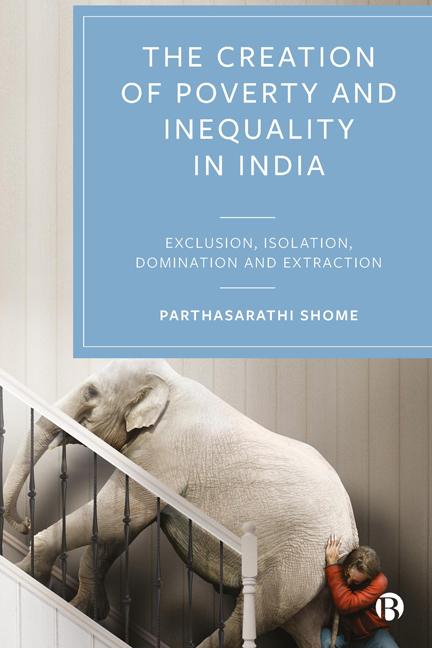Book contents
- Frontmatter
- Dedication
- Contents
- List of Figures and Tables
- Preface
- 1 Introduction
- Part I Macro-Economy and Human Development
- Part II Sources of Inequality and Poverty
- Part III Sectoral Effects
- Part IV Radical Humanism
- Appendix 2.1 Cash Use in India: A Cross-Country Comparison
- Appendix 2.2 Macro-Economic Comparisons: Selected Economies
- Appendix 4.1 Selected Country Tables
- Appendix 5.1 Evidence on Inequality in the US
- Appendix 8.1 Impact of Land Policy
- Appendix 11.1 Impact of Asset Transfer on the Poor
- Index
Appendix 5.1 - Evidence on Inequality in the US
Published online by Cambridge University Press: 18 January 2024
- Frontmatter
- Dedication
- Contents
- List of Figures and Tables
- Preface
- 1 Introduction
- Part I Macro-Economy and Human Development
- Part II Sources of Inequality and Poverty
- Part III Sectoral Effects
- Part IV Radical Humanism
- Appendix 2.1 Cash Use in India: A Cross-Country Comparison
- Appendix 2.2 Macro-Economic Comparisons: Selected Economies
- Appendix 4.1 Selected Country Tables
- Appendix 5.1 Evidence on Inequality in the US
- Appendix 8.1 Impact of Land Policy
- Appendix 11.1 Impact of Asset Transfer on the Poor
- Index
Summary
That slavery left an indelible mark on the US economy and society is without doubt. Its manifestation in the form of a continuation of inequality has been analysed by many authors. By the end of the 20th century, when economic growth slowed and inequality of income and wealth grew, whatever income gains there were, primarily benefited smaller slices of the population at the top.1 As income and wealth distribution worsened, microeconomic aspects began to be analysed revealing how worsening distribution obstructed the economy and its economic mobility. Boushey (2019) reviewed this literature comprehensively. Chetty et al. (2017) found that fewer children from the middle class and at the bottom did better than their parents did, countering the achievements of the 1960s and 1970s. They estimated that 70 per cent of the decrease in absolute mobility would not have occurred had the inequality in income and wealth been kept in check. Clearly, for the US youth to move up, the gap between incomes at the top and the bottom has to narrow.
Economic inequality led to health inequality that, in turn, exacerbated differences in lifelong skills of people. Goldin and Katz (2010); Almond and Currie (2011); Currie and Thomas (1999) – demonstrated this in various ways. In the UK, 17,000 children born during one week in 1958 and tracked through adulthood, revealed that healthier ones passed school English and maths more easily; they were 4– 5 per cent more able to have jobs, and received higher wages at age 33. Based on this, Currie and Hyson (1999) concluded that children's health at birth relates to health during life. Others related birth weight to the probability of graduating high school. Adult employment was also related to birth weight. Thus, child and family characteristics at school entry explained the number of years of education as well as other outcomes such as future employment. Epidemiologist David Barker pointed to mother's nutrition and health rather than only genetics or poor lifestyles as determinants of health disorders. These researchers have consistently taken the view that prenatal conditions had lifelong ramifications.
Education differences have had a dual directional relation with inequality, one feeding the other. Out of the 31 Organisation for Economic Cooperation and Development (OECD) member countries, the US ranks 20th in formal childcare, and 29th in preschool enrolment.
- Type
- Chapter
- Information
- The Creation of Poverty and Inequality in IndiaExclusion, Isolation, Domination and Extraction, pp. 309 - 311Publisher: Bristol University PressPrint publication year: 2023



